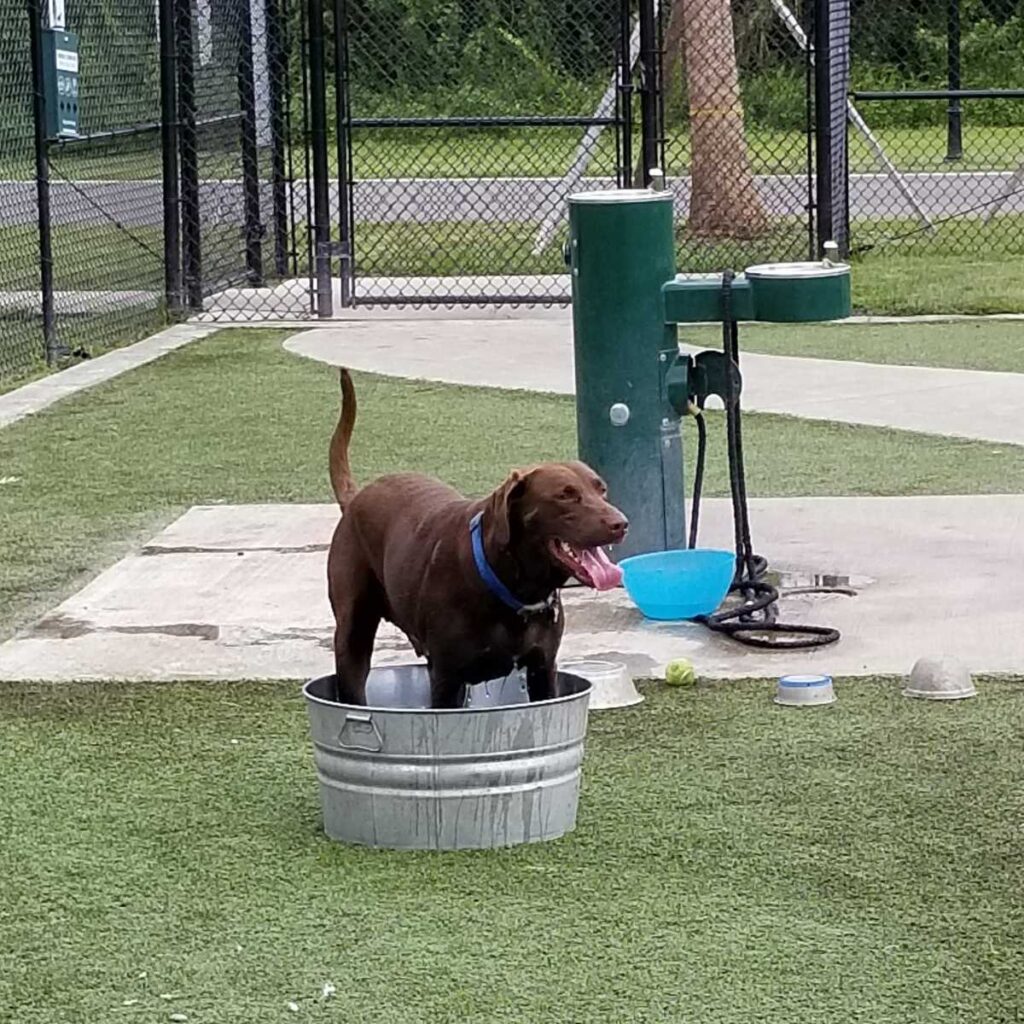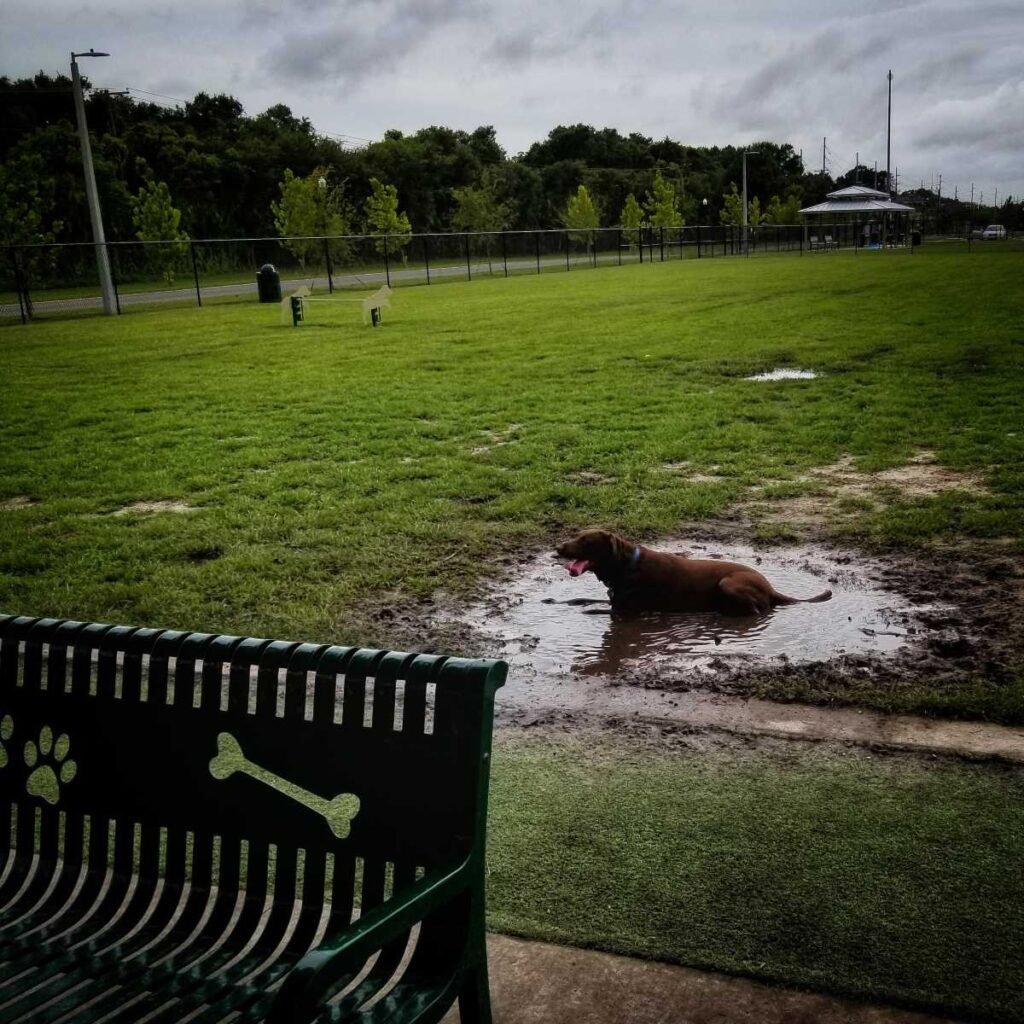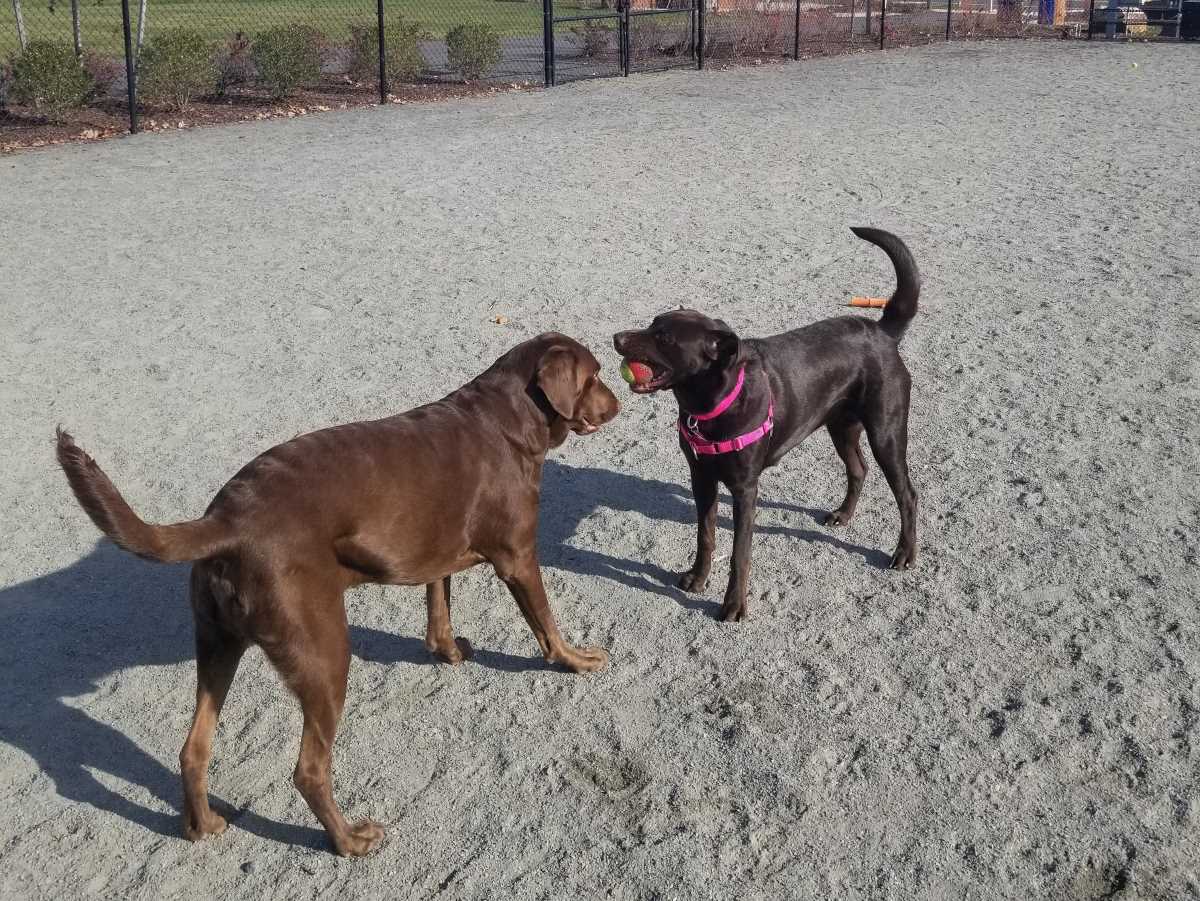Dog parks can be a great source of enjoyment and exercise for active dogs such as Labrador Retrievers, but can also bring along some concerns for dog owners.
Aggressive dogs, sickness carried by unvaccinated animals, and dirty conditions are some of the issues that you face when you’re headed to the dog park.
We’ll explain some of the positives and negatives of dog parks to be aware of before you go, and help you decide if venturing in is the right decision for you and your Labrador.
Benefits of Dog Parks
Exercise
The biggest benefit of dog parks is the ability to give your dog tremendous exercise and physical activity in a fenced-in space.
(This article may contain affiliate links. As an Amazon Associate I earn from qualifying purchases. Learn more)
This is a huge perk for people who may not have a yard for their Labrador, or may be living in an apartment with a Lab or other large-breed dog.
Most dog parks are secured with gates and high fencing that keep your dog inside the designated dog park area, while allowing them to run, play, and exercise all of their energy out.

Large, active dogs such as Labrador Retrievers need a great deal of exercise and physical activity on a typical day. A dog park can be a great opportunity to allow your Lab to run, retrieve, and play games with you to help them get that fantastic Lab energy out.
Giving your Lab proper exercise each day will help them be easier to train and manage at home, and lessen the likelihood of unwanted behaviors like Lab hyperactivity or the Dog Zoomies in Labradors.
New Smells & Mental Stimulation
The dog park is also a source of new and interesting smells, which are important to retrievers and other dogs bred for hunting and outdoor work.
Dogs have amazing noses, and Labradors’ intelligence combined with an excellent nose and strong hunt drive makes them curious and inquisitive when exposed to an environment with new smells.
Labs love to track and smell new and interesting scents of other dogs, birds, rabbits, deer, and any other animals that may make their way through and around the dog park.
This provides mental stimulation to your dog beyond what they would find in their own backyard as well as what they’d experience on a typical walk through your regular neighborhood.
Socialization With New Dog Friends
Another benefit of dog parks is that they allow your Labrador to meet new canine friends and experience socialization training.
Bringing your dog to a dog park and allowing them to socialize with other well-behaved dogs teaches your Lab to be comfortable around other dogs of many sizes and breeds.

Dogs that aren’t socialized with other dogs can become standoffish, aggressive, or fearful of other dogs.
If you attend a dog park regularly, you can even begin to see the same “doggie friends” from time to time, and if your dogs play well with each other, the humans can schedule time to come back when the group of dogs can play together.
One of our chocolate Labs has a “Labrador friend” that is a fellow chocolate Lab of almost the same size and age. They met and became friends through playing together over the course of almost a year regularly at the dog park.
Their personalities, temperaments, and physical traits are perfectly matched. When they see each other coming across the park, both Labs begin to wag and run towards each other in the hopes that they can play together at the dog park.
Connect With Other Dog Owners
Meeting other dog owners is also a great benefit to taking your dog to the dog park.
Many times owners of other dogs at the dog park will be a great resource for helpful information about dogs, your community, and important aspects of dog ownership.
You might meet other owners at dog parks that will tell you the best recommendations on what veterinarians are best, where they take their dogs for dog training school, daycare, or boarding, the names of their favorite pet sitters, and answers to other typical owner questions.
Now that we’ve covered some of the best reasons to love dog parks, let’s take a look at some of the possible risks associated with them too.
Risks of Dog Parks
Aggressive Dogs/Biting
By far the biggest risk of taking your Labrador to the dog park is the risk of aggressive or unfriendly dogs.
Many people tend to overestimate their dog’s friendliness and the amount of socialization they’ve given them.
In many cases, dogs are not simply ready for the sudden exposure to a large crowd of running or excited dogs, so they respond in typical dog fashion: biting, nipping, or snapping.
Your own dog may also behave in strange ways that are atypical of them when placed in a situation they aren’t comfortable with.
While Labrador Retrievers are not known to usually be an aggressive breed of dog, any dog can bite. And some circumstances can trigger a typically relaxed or friendly dog to react in a way that’s unusual for them.
Sometimes dog parks can be very crowded, with dog owners not always supervising their dogs at the park adequately. This can cause problems when dog owners don’t step in to address their dog’s behavior and the situation gets out of hand.
We’ve had a few experiences where our Labradors were bullied and attacked by certain dogs at the dog park, and it can cause your Labrador to become fearful or scared of other dogs in the future.
It can also cause your Lab to become nervous or anxious upon returning to that location or particular dog park.
This is true especially if you have a younger dog, such as a Labrador puppy, or if you have a sensitive or gentle-tempered dog that you’re taking to dog parks.

Sickness/Illness
When you’re playing with other dogs at the dog park, you have no way of knowing the health or vaccination history of the dogs you’re interacting with. They can expose your dog to illness or sickness.
While there may be rules and requirements posted to attend the dog park, there typically isn’t any enforcement, or any staff to ensure that the rules are being followed.
Kennel cough (bordetella) is a very common and contagious illness spread by dogs especially through close contact and shared water bowls found at dog parks, daycare, and boarding facilities.
Even if you’re playing with vaccinated dogs, the environment of the dog park can expose your dog to sickness and illness through contaminated water or soil (including at a dog beach), and create possible issues such as giardia and leptospirosis.
You and your dog can also be exposed to ticks carrying Lyme Disease, as well as your dog exposed to mosquitos carrying heartworms that can cause heartworm disease in dogs.
Talk with your veterinarian about whether or not they think it’s a good idea for your particular dog to participate in dog parks. Some vets are very passionate about this topic, and their response may be more relevant to you for your particular dog’s health history and personality.
Picking Up Bad Habits
Your dog might pick up some other bad habits from other dogs at the dog park.
Sometimes your dog might learn aggressive behaviors such as jumping on people, humping other dogs, digging, eating grass, and running away from you when exposed to an environment where other dogs are doing this.
You may find you need to intervene more at the dog park to correct unwanted behavior before it becomes a habit for your dog.
Socialization can be a great thing for dogs, especially playful and active breeds like Labradors, but some additional training might be necessary for you and your dog if you notice them picking up on unwanted behaviors from time spent at the park.
Dirty/Messy Conditions
Labradors typically love to play in the dirt and mud, and Labs usually are great swimmers who love the water.
At the dog park you may encounter substances such as mud, dirt, gravel, rocks, sticks, woodchips, and grass. And if there’s a water feature, your Lab might be the first to find it!
While your Labrador might think these features are the best thing ever, you might realize that your dog is covered in dirt or mud after playing at the dog park, and taking them to one can cause a lot of mess for you and your car.
Labs will often need a bath after a trip to the dog park, depending on the weather and the conditions of the day.
This is just a typical trip to the dog park for many Labrador families:

Some dog parks will come equipped with a shower or rinse-off area near the exit to allow you to attempt to get as much of the dirt and mud off your dog as possible.
We recommend bringing many towels for your dog and your car, as well as possibly a travel crate to contain the mess on your ride home.
How to Have a Good Experience at the Dog Park
If you’ve decided to take your Lab to the dog park, there are few things you can do to make the experience better for you and your dog.
Here are a few suggestions that may result in a happier outcome at the dog park:
- Pick a Cooler & Quieter Time of Day to Go
- Bring Along Another Dog Your Dog Already Knows (And Plays Well With)
- Go Slowly & Watch for Signs of Problems or Abnormal Behavior in Dogs
- Introduce Dogs Slowly When Arriving (Read more in our article on How to Introduce a New Dog)
- Bring Your Own Water Bowl & Water
- Bring Your Own Toys, Though They May Get Destroyed
- You Can Ask Other Owners About Vaccinations, But You May Not Get the Truth
- Supervise Your Dog at All Times & Don’t Leave Them Alone
- Don’t Hesitate to Leave Immediately If You Don’t Like the Setting or Other Dogs
You may end up finding a certain dog park meets your needs better than other locations, or that there are some settings that just don’t work for you or your Lab.
You may also end up finding just the right friendly faces, both human and canine, for your dog to join at the dog park and make some fun friendships over time.
Summary: Pros & Cons of Dog Parks
Dog parks can be a great way to exercise your dog, especially an active and athletic breed such as a Labrador Retriever.
However, you’ll want to make sure you watch out for aggressive dog behavior, and make sure you take steps to protect your dog as much as possible from illness or sickness. If you’re not sure if it’s safe for your dog, ask your vet.
With some careful steps, you may be able to make dog parks an occasional part of your Lab’s routine!








Very insightful.